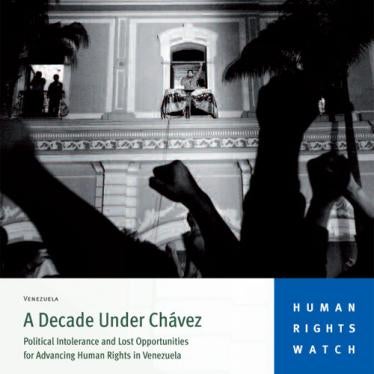(Washington, DC) – The Venezuelan government should promptly adopt concrete measures to comply with an Inter-American Court order to protect Humberto Prado, a human rights defender who has been the target of multiple threats, Human Rights Watch said today.
On August 27, 2011, Prado, director of the nongovernmental organization Venezuelan Observatory of Prisons, returned to Venezuela after several weeks in Europe, where he traveled in June after a series of threatening calls. Amnesty International had invited Prado to participate in a series ofpublic speaking events on human rights, and he was also planning to participate in an exchange with other nongovernmental organizations. The threats followed accusations by high-level officials and in several official media outlets that he was “destabilizing the prison system” after a riot and clashes between inmates and members of the National Guard in two prisons led to the deaths and injuries of several inmates and officers. The day he returned to Venezuela he received an anonymous email with a photographic image of what appears to be an official document from the Attorney General's Office stating that Prado is under criminal investigation for his alleged involvement in unspecified acts that could constitute “treason” and “incitement to commit crimes.”
“Open hostility by high-level officials against human rights defenders is completely unacceptable,” said José Miguel Vivanco, Americas director at Human Rights Watch. “Instead of questioning the work of civil society organizations, the government should ensure that defenders can do their job without fear of reprisals.”
The Inter-American Court of Human Rights instructed Venezuela in November 2009 to protect Prado, who, the court said, was facing a “grave risk for his life and integrity.” The government has not taken any steps to protect him.
On May 27, 2010, Prado participated in a peaceful demonstration in front of the Supreme Court with families of people in detention, protesting long delays in judicial procedures and prison violence. A week later, seven unknown people dressed in black, wearing sunglasses and riding motorcycles without license plates, appeared at his apartment building when Prado was not home and asked a building employee for the “director of prisons.”
On June 18, 2011, after Prado called for the government to deal with a prison riot in the El Rodeo prisons peacefully, Justice Minister Tarek El Aissami accused Prado on La Hojilla – an opinion show aired on an official TV channel – of “destabilizing the prison system” and having been “an accomplice in the massacre of inmates” in the past. Press accounts said that on June 22, Vice President Elías Jaua claimed that opposition leaders, private television stations, and representatives of nongovernmental organizations were executing a strategy to “politically destabilize the country.”
Several official media outlets also sought to discredit Prado. The host of La Hojilla accused the National Observatory of Prisons, under Prado’s leadership, of “preparing an internal war between inmates.” The Venezuelan News Agency said that an unnamed inmate told them that human rights groups had “guided” the leaders of prison mafias in the country. The newspaper VEA printed an article accusing the US government of funding leaders in Venezuelan prisons who are involved in these incidents, as well as nongovernmental organizations, including Prado’s, to “appear at the scene.”
After these statements, Prado was repeatedly threatened. In a public letter, local nongovernmental organizations said that a blog had published Prado’s contact information, including his phone number and home address, with a note stating, “Family information to come soon… so that the people try him. Capital punishment.” Prado received several phone calls telling him he should “shut up” if he cared about his children. Prado’s wife received an anonymous call stating Prado “would be the next one to fall.”
On June 27, Prado fled Venezuela. During the following week, a group of unknown people riding motorcycles went to his house and asked the doorman if he still lived there, and a group of uniformed women, allegedly from the National Guard, asked the doorman on a separate occasion if Prado’s apartment was available for rent. Prado told Human Rights Watch he interpreted these visits as threats, which led him to have his family leave Venezuela.
Prado returned to Venezuela on August 27 to continue his work to promote basic rights of prisoners in the country, he told Human Rights Watch.
Governments have a special obligation to protect human rights defenders against risks that they may face as a direct result of their work. The Inter-American Court of Human Rights emphasized the importance of the work of human rights defenders when it said, for example, that “respect for human rights in a democratic state depends largely on human rights defenders enjoying effective and adequate guarantees so as to freely go about their activities, and it is advisable to pay special attention to those actions that limit or hinder the work of human rights defenders.”
The Chávez administration has shown an aggressively adversarial posture toward local human rights defenders and civil society organizations. In its 2008 report “A Decade Under Chávez,” Human Rights Watch documented how the government has investigated rights advocates on groundless or grossly exaggerated criminal charges, sought to discredit and undermine rights organizations through unfounded allegations of complicity in subversion, sought to exclude organizations receiving foreign funding from participating in international forums, and promoted legislation to allow arbitrary state interference in rights organizations’ fundraising and operations.
In December 2010, the National Assembly adopted two laws – the Law for the Defense of Political Sovereignty and National Self Determination and the Organic Law on Social Control – that, if applied to human rights organizations, would further undermine their ability to work independently.







